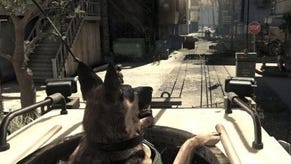Call Of Duty
Is it Mission Accomplished for Infinity Ward?
As much as we're looking forward to the next Medal Of Honor, we were convinced that the 'real' deal would be found in Call of Duty, Allied Assault's thinly disguised pseudo-sequel, produced by two dozen former 2015 inmates. After numerous tempting demos, presentations and even an extensive hands-on preview, we just went ahead and bought a copy from the US - such was our salivating requirement to sample what appeared to be the best World War II related FPS yet.
Some of you may be wearily contemplating yet another romp through the bloody conflicts that comprised WWII, and it is undoubtedly the most overused gaming scenario ever - but for good reason. The war, played out from so many perspectives, was so finely balanced, and told so many against-the-odds tales in such a backdrop of chaos and tension that there was almost limitless material to draw upon.
However, unlike its contemporaries, Call Of Duty addresses the often one-dimensional Allies vs. Axis slant by placing the player in three different theatres of combat in turn. Kicking off from the perspective of an American GI, the game switches to a British Paratrooper's viewpoint before culminating in a harrowing campaign seen through the eyes of a Russian conscript. In a pleasing display of attention to detail, each has their own weapons, uniforms, facial characteristics and accents, and Infinity Ward constantly bombards the player with incidental narrative to really make the game world come alive.
Freeform war Jazz
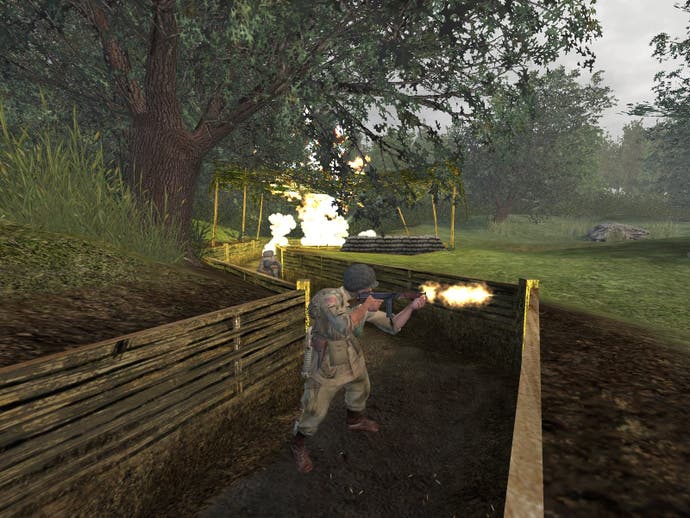
Rather than be restricted to a parallel timeline, the player swings backwards and forwards in time (slightly confusingly) over a period of two and a half years between August 1942 and April 1945, taking in US attempts to aid the D-Day beach landings of Normandy, aiding the British Dambuster bombings on the Eder Dam, and helping the Russians retake Red Square before the campaign climaxes with three individual 'mopping up' missions, which set the seal on the defeat of the Nazi aggressors.
As the two single-player demos more than amply demonstrated, Call Of Duty is an immensely cinematic game, using a huge number of scripted events to deliver an almost bewildering array of memorable moments. Medal Of Honor was as cinematic as they come, but Infinity Ward has raised the stakes considerably in creating a seat of the pants thrill ride that rarely allows you to pause for breath. Almost all the way through the game you're accompanied by an unending succession of buddies, who not only provide a useful degree of support, but do so in as convincing a fashion as anyone's managed to date.
Although their movements are utterly scripted, i.e. dependent on the removal of key enemies, it's hard not to be impressed by the dynamic way each soldier seeks cover, finding a suitable place to return fire while simultaneously shouting exclamations and instructions. Their path finding, too, is generally excellent, and unlike so many games you won't find them running like headless chicken into walls or stubbornly getting in your way. In fact, it's a joy to at last witness a game that has enemy and buddy AI capable of doing the basic things with ease.
Get over it
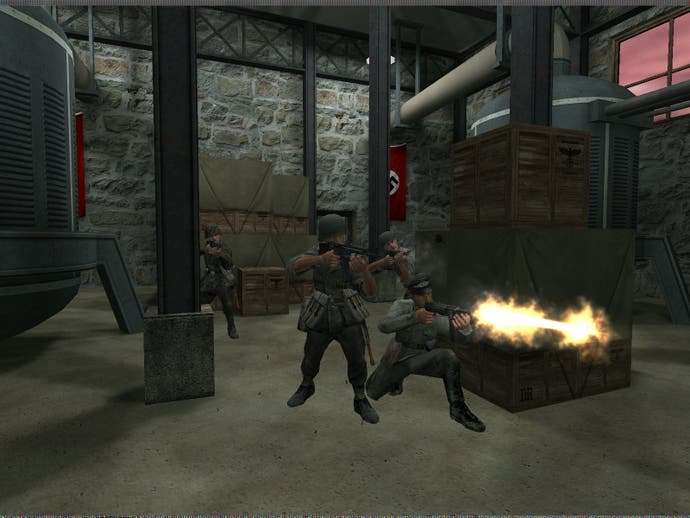
Obstacles and low walls are no problem and they mount them with ease. Enter a room with an abandoned gun emplacement and one of them will use it (and they'll also leave it if you want a go). What's more, they'll peep around cracks and return fire, helping you to take out a whole posse of enemies in the process - in general they just look like they know what they're doing, and do so without ever becoming a hindrance. Expressing that with ageing Quake III Arena tech at the game's core is a feat worthy of serious applause.
As an all round spectacle, the game doesn't come anywhere near the heights of the various forthcoming FPSs it's brushing shoulders with on Most Wanted lists, namely the likes of Far Cry, Doom III, Half-Life 2 and STALKER, but its more humble technical origins mean that just about anyone will be able to run it at full detail with minimal frame rate loss. For example, with everything turned up to max, our P4 2.2GHz, GeForce 4 Ti4600 system with 512 MB RAM only came unstuck during the more insane sequences in Red Square [and my 1.8GHz system with a Radeon 9700 Pro and less memory did fine to boot -Tom]. Elsewhere it was as smooth as you could wish for, and the team has made the most of now ageing tech, managing to render some fairly hectic maps with dozens of soldiers on screen at once, although don't believe the hype about 'up to 300 soldiers at once', because it simply doesn't happen. 'More than 20 odd' would be a more accurate proclamation, but we guess that doesn't quite hit the mark for bold statements.
The character models are generally pretty decent; each with their own unique (but fairly similar) facial models, a great level of detail, tons of incidental animation and a slightly concerning running posture to boot. The environments all look fantastic from a distance, and even close up benefit from some decent texturing. Inevitably some areas are better than others, and while some rubble-strewn environments are excellent, things can start to feel samey quite quickly. Then again, given that some levels can be completed in 10 or 20 minutes, it feels a shame that you almost blink and miss entire areas - some of which are lavishly decorated.
Another game to blitz through
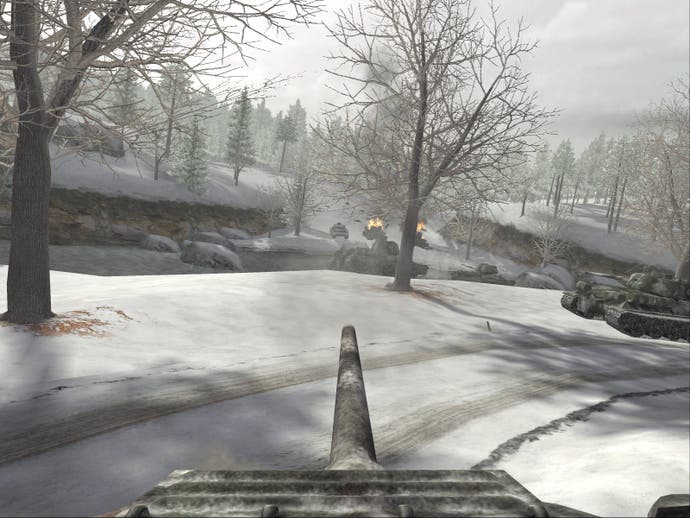
In fact, played on even the third difficulty level (out of four), you'll probably rip through most of Call Of Duty in no time - certainly less than eight hours, and only a couple more than that at the most demanding level with careful use of quicksave. We'd certainly recommend you steer well clear of the first or second difficulty levels, as they're almost ridiculously easy, scattering the play area with medipacks, ruining the challenge. If you like games which can be polished off in a couple of evenings' play, then Call Of Duty will fit the bill, but having just achieved exactly that we're not convinced it harbours a great deal of reply value for single players. In fact, rather shockingly, once we'd settled into the pattern of play, we were stuck with the stark realisation that Call Of Duty is nothing more than a very polished Medal Of Honor.
For all its pyrotechnics, cinematics and impressive touches, it's actually a by-the-numbers shooter with practically zero innovation. All the bits you've seen before are present and correct; the blow up X number of Anti Aircraft guns missions, the sniper missions, a handful of Omaha-beach style against-the-odds nightmares, some on-rails shooting from the back of a jeep, retrieve the Top Secret docs, rescue so-and-so from the POW camp, tanks missions, and so on. Within the limiting context of World War II it's hardly surprising, but what is perhaps surprising is that Infinity Ward does virtually nothing to stray outside of the boundaries of conventional FPSs.
Although your heart might be pounding at the excitement of aircraft roaring overhead as your boat slowly enters the a Russian dock, and you might well be amazed as yet another bomb blast goes off feet away from you while the relentless rattle of gunfire also deafens the life out of you, it's no more than a passive backdrop to create an atmosphere. It most certainly creates a rich atmosphere of terror, but ultimately it's just a passive means of filling in the blanks. This rigid adherence to scripted events makes it very entertaining to watch, and helps drives the narrative effectively, but the game never once presents the player with an alternative. Nothing ever moves on until you play the game exactly by the developer's rules and should you ever decide to try and break those rules, it's a fairly comical sight.
Those pesky cheating Allies
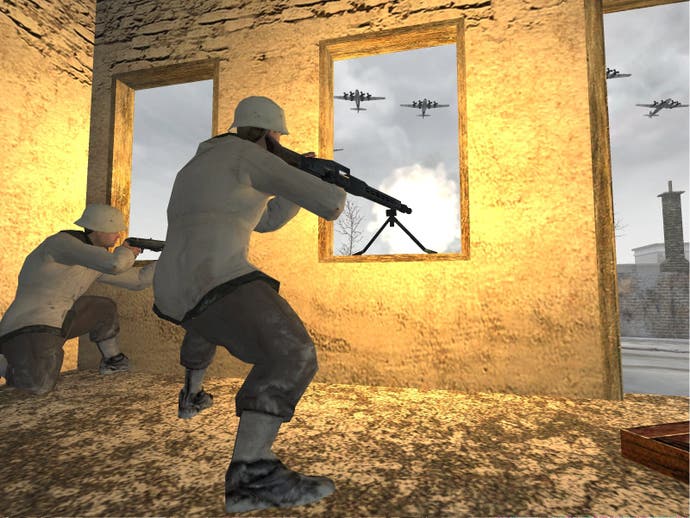
Allies magically respawn, even when your crew has been wiped out (allegedly they're 'reinforcements', but it just looks like the game's cheating in order to keep the illusion going), making any attempt to keep your buddies alive fairly pointless, and as a result of their fleeting appearances, it's tough to relate to any of them in any sense other than being the current level's cannon fodder. Even more curious is the fact that key members are basically indestructible, taking any amount of enemy fire in their stride, while enemies similarly spring back to life, never showing any ill effect from being raked with machine gun fire. If they were to show any visible sign of damage that would help, but the squeaky clean nature of Call Of Duty demands that there's no blood at any stage, no limbs blown off, and no injuries. All you get for your hail of lead is a slumped, beautifully preserved body - or one that should have been dead rising back up like a Terminator to continue firing deadly accurate shots like nothing ever happened.
As we've touched upon, the on-rails nature is both a blessing and a curse. On the one hand, it's great to never find yourself cluelessly wandering around not knowing what to do. Being able to just seamlessly wander between one action sequence after another is something we'd be foolish to criticise - it makes for a heady experience and means there's very little fat in the game; no wasted time pottering about clicking on everything in the vague hope you might find something of use. In fact, right from the word go the game makes it explicitly clear that you never need to open a door. But sometimes CoD takes this hand-holding to a patronising extreme. For example, the 'magic compass' tells you exactly where to go to for your next objective, and leaves absolutely nothing for the player to do other than just shoot and survive.
This whole 'switch off and shoot' approach might appeal to gamers of a certain mindset, or maybe it'll just suit your mood when you're up for some dirty-vest shooting action, but it's disturbingly easy to feel more than a little bored by a game that demands precious little brain engagement. I've used this analogy before when talking about Medal Of Honor titles, but it's just as relevant here; CoD is the gaming equivalent of a fairground thrill ride or a dumb action movie. Its place is to be 'intense' and 'awesome' and all those throwaway statements that get sprinkled over games such as these, and to those ends it most certainly delivers, offering up one seat of the pant sequence after another.
Are you a sponge or a stone?
Ultimately whether you decide to shell out for CoD comes down to two basic related issues: how much being restricted by an on rails adventure annoys you, or conversely how much you enjoy being led by the hand through an extremely cinematic depiction of World War II.
Picking the splinters out of my arse for a moment, the fact remains it's easy to get carried away with CoD, and I'm left with the impression that many people will come away with a sugary action movie fix after playing it. Max Payne 2 did that for me, CoD didn't - once the novelty wore off, I found myself fairly bored for most of the second half of the game and although I felt I'd had fun, it felt shallow, hollow and formulaic. Not a major advancement for a genre that's been stuck in a rut for too long.
The sure sign of any game's merits is to draw up a list of pros and cons, and where I fell out with CoD was the fact that however many cool things I could think of, it was all too easy to peel away the layers of glitz and gloss and come up with frustratingly long list of inconsistencies, flaws and slightly irksome design decisions that remind you that there's plenty of work to be done before the definitive World War II shooter gets made. If you've never played a World War II action shooter before then you'll be in for a massive treat (and the score should probably be upped accordingly for you), but for the hardened veterans among us, we're casting our eyes back to EA.




